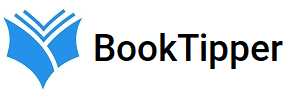Featured New Releases

BEGIN AGAIN
by Eddie S. Glaude, Jr.
James Baldwin grew disillusioned by the failure of the civil rights movement to force America to confront its lies about race. In our own moment, when that confrontation feels more urgently needed than ever, what can we learn from his struggle?
“In the midst of an ugly Trump regime and a beautiful Baldwin revival, Eddie Glaude has plunged to the profound depths and sublime heights of Baldwin’s prophetic challenge to our present-day crisis.”—Cornel West
We live, according to Eddie S. Glaude Jr., in a moment when the struggles of Black Lives Matter and the attempt to achieve a new America have been challenged by the election of Donald Trump, a president whose victory represents yet another failure of America to face the lies it tells itself about race. From Charlottesville to the policies of child separation at the border, his administration turned its back on the promise of Obama’s presidency and refused to embrace a vision of the country shorn of the insidious belief that white people matter more than others.
We have been here before: For James Baldwin, these after times came in the wake of the civil rights movement, when a similar attempt to compel a national confrontation with the truth was answered with the murders of Medgar Evers, Malcolm X, and Martin Luther King, Jr. In these years, spanning from the publication of The Fire Next Time in 1963 to that of No Name in the Street in 1972, Baldwin transformed into a more overtly political writer, a change that came at great professional and personal cost. But from that journey, Baldwin emerged with a sense of renewed purpose about the necessity of pushing forward in the face of disillusionment and despair.
In the story of Baldwin’s crucible, Glaude suggests, we can find hope and guidance through our own after times, this Trumpian era of shattered promises and white retrenchment. Mixing biography—drawn partially from newly uncovered interviews—with history, memoir, and trenchant analysis of our current moment, Begin Again is Glaude’s endeavor, following Baldwin, to bear witness to the difficult truth of race in America today. It is at once a searing exploration that lays bare the tangled web of race, trauma, and memory, and a powerful interrogation of what we all must ask of ourselves in order to call forth a new America.
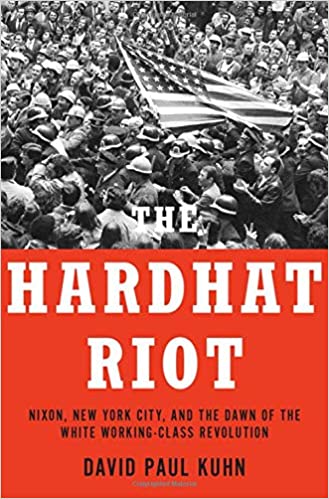
THE HARDHAT RIOT
by David Paul Kuhn
In May 1970, four days after Kent State, construction workers chased students through downtown Manhattan, beating scores of protesters bloody. As hardhats clashed with hippies, it soon became clear that something larger was underway–Democrats were at war with themselves. In The Hardhat Riot, David Paul Kuhn tells the fateful story of when the white working class first turned against liberalism, when Richard Nixon seized the breach, and America was forever changed. It was unthinkable one generation before: FDR’s “forgotten man” siding with the party of Big Business and, ultimately, paving the way for presidencies from Ronald Reagan to Donald Trump.
This is the story of the schism that tore liberalism apart. In the shadow of the half-built Twin Towers, on the same day the Knicks rallied against the odds and won their first championship, we experience the tumult of Nixon’s America and John Lindsay’s New York City, as festering division explodes into violence and Nixon’s advisors realize that the Democratic coalition has collapsed, that this is their chance, because “these, quite candidly, are our people now.”
In this riveting story–rooted in meticulous research, including thousands of pages of never-before-seen records–we go back to a harrowing day that explains the politics of today. We experience an emerging class conflict between two newly polarized Americas, and how it all boiled over on one brutal day, when the Democratic Party’s future was bludgeoned by its past.

OF BEARS AND BALLOTS
by Heather Lende
The writer whom the Los Angeles Times calls “part Annie Dillard, part Anne Lamott” now brings us her quirky and compassionate account of holding local office.
Heather Lende was one of the thousands of women inspired to take a more active role in politics during the past few years. Though her entire campaign for assembly member in Haines, Alaska, cost less than $1,000, she won! But tiny, breathtakingly beautiful Haines—a place accessible from the nearest city, Juneau, only by boat or plane—isn’t the sleepy town that it appears to be: from a bitter debate about the expansion of the fishing boat harbor to the matter of how to stop bears from rifling through garbage on Main Street to the recall campaign that targeted three assembly members, including Lende, we witness the nitty-gritty of passing legislation, the lofty ideals of our republic, and how the polarizing national politics of our era play out in one small town.
With an entertaining cast of offbeat but relatable characters, Of Bears and Ballots is an inspirational tale about what living in a community really means, and what we owe one another.

DETECTIVE IN THE DOORYARD
by Timothy C. Cotton
Tim Cotton has been a police officer for more than thirty years. The writer in him has always been drawn to the stories of the people he has met along the way. Dealing with the standard issue ne’er-do-wells as a patrol officer, homicide detective, polygraph examiner, and later as the lieutenant in charge of the criminal investigation division certainly provides an interesting backdrop—but more often he writes about the regular folks he encounters, people who need his help, or those who just want to share a joke or even a sad story.
The Detective in the Dooryard is composed of stories about the people, places, and things of Maine. There are sad stories, big events, and even the very mundane, all told from the perspective of a seasoned police office and in the wry voice of a lifelong Mainer. Many of the stories will leave you chuckling, some will invariably bring tears to your eyes, but all will leave you with a profound sense of hope and positivity.

SHADOW STATE
by Luke Harding
A thrilling account of how Russia is waging a hidden war against America and the West, using espionage, corruption, fake news, and KGB-style murder
March 2018. Two Russian assassins arrive in a provincial English city to kill a former officer from Russia’s GRU intelligence agency. His crime? Passing secrets to British spies. The poison? A lethal nerve agent, novichok. The attempted execution was a reminder – as if one were needed – of Russia’s contempt for international norms. The Soviet Union and its doctrine are long gone, but the playbook used by the Kremlin’s spies during that long confrontation with the West is back. And the underlying goal remains the same: to undermine democracy and exploit divisions within American and European society and politics.
Moscow’s support for Donald Trump in the 2016 presidential election has grown into the biggest political scandal of modern times. Its American players are well-known. In Shadow State, award-winning journalist and bestselling author Luke Harding reveals the Russians behind the story: the spies, hackers and internet trolls. Harding charts how the Kremlin has updated Communist-era methods of influence and propaganda for the age of Facebook and Twitter, and considers the compelling question of our age: what exactly does Vladimir Putin have on President Trump?
Similar to those of the Cold War, Putin’s ambitions are truly global. His emissaries include oligarchs, bankers, lawyers, mercenaries, and agents of influence. They roam from Salisbury to Helsinki, Ukraine to Central Africa, London to Washington, D.C. Shadow State is the singular account of how the Kremlin seeks to reshape the world, to divide the US from its European friends, and to remake America in its own dark and kleptocratic image. This is an essential read for anyone who wants to understand how our politics came to be so chaotic and divided. Nothing less than the future of Western democracy is at stake.
Still Hot in Non-Fiction & Biography

COUNTDOWN 1945
by Chris Wallace
From Chris Wallace, the veteran journalist and anchor of Fox News Sunday, comes an electrifying behind-the-scenes account of the 116 days leading up to the American attack on Hiroshima.
April 12, 1945: After years of bloody conflict in Europe and the Pacific, America is stunned by news of President Franklin D. Roosevelt’s death. In an instant, Vice President Harry Truman, who has been kept out of war planning and knows nothing of the top-secret Manhattan Project to develop the world’s first atomic bomb, must assume command of a nation at war on multiple continents—and confront one of the most consequential decisions in history. Countdown 1945 tells the gripping true story of the turbulent days, weeks, and months to follow, leading up to August 6, 1945, when Truman gives the order to drop the bomb on Hiroshima.
In Countdown 1945, Chris Wallace, the veteran journalist and anchor of Fox News Sunday, takes readers inside the minds of the iconic and elusive figures who join the quest for the bomb, each for different reasons: the legendary Albert Einstein, who eventually calls his vocal support for the atomic bomb “the one great mistake in my life”; lead researcher J. Robert “Oppie” Oppenheimer and the Soviet spies who secretly infiltrate his team; the fiercely competitive pilots of the plane selected to drop the bomb; and many more.
Perhaps most of all, Countdown 1945 is the story of an untested new president confronting a decision that he knows will change the world forever. Truman’s journey during these 116 days is a story of high drama: from the shock of learning of the bomb’s existence, to the conflicting advice he receives from generals like Dwight D. Eisenhower and George Marshall, to wrestling with the devastating carnage that will result if he gives the order to use America’s first weapon of mass destruction.
But Countdown 1945 is more than a book about the atomic bomb. It’s also an unforgettable account of the lives of ordinary American and Japanese civilians in wartime—from “Calutron Girls” like Ruth Sisson in Oak Ridge, Tennessee, to ten-year-old Hiroshima resident Hideko Tamura, who survives the blast at ground zero but loses her mother and later immigrates to the United States, where she lives to this day—as well as American soldiers fighting in the Pacific, waiting in fear for the order to launch a possible invasion of Japan.
Told with vigor, intelligence, and humanity, Countdown 1945 is the definitive account of one of the most significant moments in history.
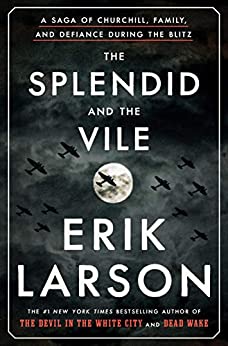
SPLENDID AND THE VILE
by Erik Larson
On Winston Churchill’s first day as prime minister, Adolf Hitler invaded Holland and Belgium. Poland and Czechoslovakia had already fallen, and the Dunkirk evacuation was just two weeks away. For the next twelve months, Hitler would wage a relentless bombing campaign, killing 45,000 Britons. It was up to Churchill to hold his country together and persuade President Franklin Roosevelt that Britain was a worthy ally—and willing to fight to the end.
In The Splendid and the Vile, Erik Larson shows, in cinematic detail, how Churchill taught the British people “the art of being fearless.” It is a story of political brinkmanship, but it’s also an intimate domestic drama, set against the backdrop of Churchill’s prime-ministerial country home, Chequers; his wartime retreat, Ditchley, where he and his entourage go when the moon is brightest and the bombing threat is highest; and of course 10 Downing Street in London. Drawing on diaries, original archival documents, and once-secret intelligence reports—some released only recently—Larson provides a new lens on London’s darkest year through the day-to-day experience of Churchill and his family: his wife, Clementine; their youngest daughter, Mary, who chafes against her parents’ wartime protectiveness; their son, Randolph, and his beautiful, unhappy wife, Pamela; Pamela’s illicit lover, a dashing American emissary; and the advisers in Churchill’s “Secret Circle,” to whom he turns in the hardest moments.
The Splendid and the Vile takes readers out of today’s political dysfunction and back to a time of true leadership, when, in the face of unrelenting horror, Churchill’s eloquence, courage, and perseverance bound a country, and a family, together.
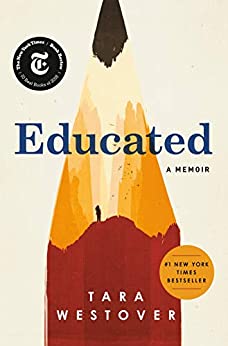
EDUCATED: A MEMOIR
by Tara Westover
An unforgettable memoir about a young girl who, kept out of school, leaves her survivalist family and goes on to earn a PhD from Cambridge University
Born to survivalists in the mountains of Idaho, Tara Westover was seventeen the first time she set foot in a classroom. Her family was so isolated from mainstream society that there was no one to ensure the children received an education, and no one to intervene when one of Tara’s older brothers became violent. When another brother got himself into college, Tara decided to try a new kind of life. Her quest for knowledge transformed her, taking her over oceans and across continents, to Harvard and to Cambridge University. Only then would she wonder if she’d traveled too far, if there was still a way home.
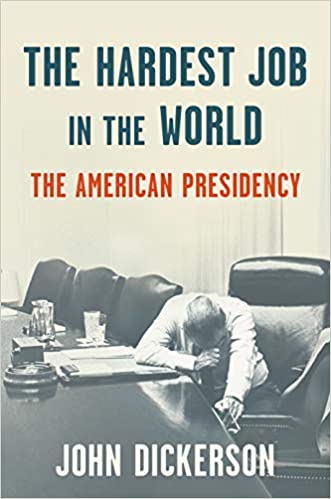
THE HARDEST JOB IN THE WORLD
by John Dickerson
Imagine you have just been elected president. You are now commander-in-chief, chief executive, chief diplomat, chief legislator, chief of party, chief voice of the people, first responder, chief priest, and world leader. You’re expected to fulfill your campaign promises, but you’re also expected to solve the urgent crises of the day. What’s on your to-do list? Where would you even start? What shocks aren’t you thinking about?
The American presidency is in trouble. It has become overburdened, misunderstood, almost impossible to do. “The problems in the job unfolded before Donald Trump was elected, and the challenges of governing today will confront his successors,” writes John Dickerson. After all, the founders never intended for our system of checks and balances to have one superior Chief Magistrate, with Congress demoted to “the little brother who can’t keep up.”
In this eye-opening book, John Dickerson writes about presidents in history such a Washington, Lincoln, FDR, and Eisenhower, and and in contemporary times, from LBJ and Reagan and Bush, Obama, and Trump, to show how a complex job has been done, and why we need to reevaluate how we view the presidency, how we choose our presidents, and what we expect from them once they are in office. Think of the presidential campaign as a job interview. Are we asking the right questions? Are we looking for good campaigners, or good presidents? Once a candidate gets the job, what can they do to thrive? Drawing on research and interviews with current and former White House staffers, Dickerson defines what the job of president actually entails, identifies the things that only the president can do, and analyzes how presidents in history have managed the burden. What qualities make for a good president? Who did it well? Why did Bill Clinton call the White House “the crown jewel in the American penal system”? The presidency is a job of surprises with high stakes, requiring vision, management skill, and an even temperament. Ultimately, in order to evaluate candidates properly for the job, we need to adjust our expectations, and be more realistic about the goals, the requirements, and the limitations of the office.
As Dickerson writes, “Americans need their president to succeed, but the presidency is set up for failure. It doesn’t have to be.”
